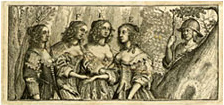William Coles, Adam in Eden or Nature's Paradise (1657)
Full Text
Not available
EEBO/TCP
Not available
Date
1657
Author
William Coles Note: 30/09/2005
Book title
Adam in Eden: Or, Natures Paradise. The History of Plants, Fruits, Herbs and Flowers. With Their several Names, whether Greek, Latin or English; the places where they grow; their Descriptions and Kinds; their times of flourishing and decreasing; as also their several Signatures, Anatomical appropriations, and particular Physical Vertues; Together with necessary Observations on the seasons of Planting, and gathering of our English Simples with Directions how to preserve them in their Compositions or otherwise .... For the Herbalists greater benefit, there is annexed a Latin and English Table of the several names of Simples; With another more particular Table of the Diseases, and their Cures, treated of in this so necessary a Work
Publication place
London
Printer
J. Streater
Publisher
Nathaniel Brooke
Text type
printed book
Genre
Hard-word, term-of-art, and dialect dictionaries, glossaries, and definitions
Subject area
- herbal
- Latin
Summary
343 chapters, each devoted to one plant; "Index Latinus Nominum in quo Numerus ad Caput refertur" (after page 629)
Language
headwords: English
explanations: English
other languages: Greek, Spanish, Latin, etc.
explanations: English
explanations: English
other languages: Greek, Spanish, Latin, etc.
explanations: English
Word-group
type: alphabetical
Word-entry
type: logical
sample: IT is not probable that I should shew you by what names the ancient Greek and Latine Writers did call these kinds of Plants, they being as I suppose knowne to neither of them, being brought of later years from the Indies, so that I hope it will be sufficient to tell you how the Moderne Writers have called them. Clusius calleth them the Spanish Potatoes, which are those in most request now amongst us, Battata, Camotes, Amotes and Ignanes, or as some write it Inhames. Those of Virginia are called Battata and Battatas Virginiana sive Virginianorum, Papas, Papus and Pappus. Those of Canada which we in English call Jerusalem Artichocks, because the Root being boyled is in taste like the bottom of an Artichock, are called by Pelleterius, Heliotropium Indicum tuberosum, by Columna, Flos Solis Farnesianus, sive Aster Peruvianus tuberosus. The Names and Kinds being thus mixed together, I shall proceed to the description of those that are called Spanish Potatoes, because they are most for our purpose, as being most respected. (eeee1r)
sample: IT is not probable that I should shew you by what names the ancient Greek and Latine Writers did call these kinds of Plants, they being as I suppose knowne to neither of them, being brought of later years from the Indies, so that I hope it will be sufficient to tell you how the Moderne Writers have called them. Clusius calleth them the Spanish Potatoes, which are those in most request now amongst us, Battata, Camotes, Amotes and Ignanes, or as some write it Inhames. Those of Virginia are called Battata and Battatas Virginiana sive Virginianorum, Papas, Papus and Pappus. Those of Canada which we in English call Jerusalem Artichocks, because the Root being boyled is in taste like the bottom of an Artichock, are called by Pelleterius, Heliotropium Indicum tuberosum, by Columna, Flos Solis Farnesianus, sive Aster Peruvianus tuberosus. The Names and Kinds being thus mixed together, I shall proceed to the description of those that are called Spanish Potatoes, because they are most for our purpose, as being most respected. (eeee1r)
Alston
XVII.I.245
Wing
C 5087




